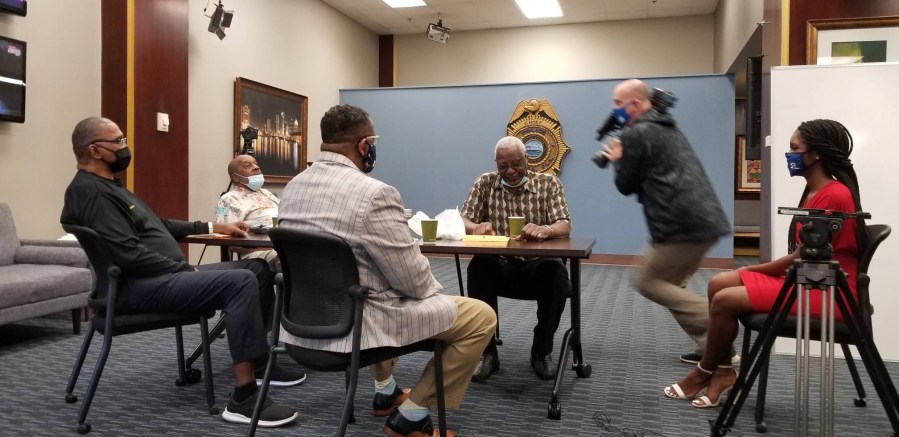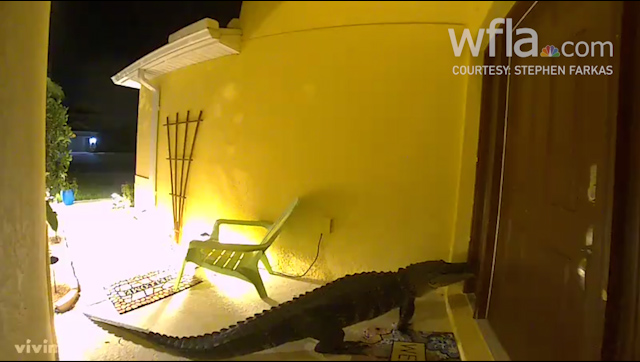TAMPA, Fla. (WFLA) — Racism and discrimination still plagued police departments in the 1960s and 70s, but four Tampa police officers filed and won a lawsuit that would change that forever.
“They called us negroes back then,” Rufus Lewis said.
By back then, Lewis was only referring to 50 years ago.
“I remember when I was in intelligence,” Clarence Nathan said.
Sitting around a table at their old stomping grounds, drinking cups of joe. Frank Joe, Lewis Rufus, James Dukes and Clarence Nathan shared memories after fifty years of grit, perseverance and brotherly love.

“I applied for the police department in 1962,” said Frank Gray.
Gray is currently the oldest living Black Tampa police officer. He along with his three bothers joined the force between 1962 and 1970. It was a time where the majority of their colleagues were white and hated them.
“That racial slur, they would go over the radio with that all the time,” Nathan said. “They’d say ‘I’m chasing a N**** male, but when you confront them they say Negro.”
Racism and discrimination stared Gray, Rufus, Duke and Nathan in the face everyday. This, even after the Civil Rights Act of 1964 was passed.
“I was standing in Colonel Diamond’s office when they called the white funeral homes to ask them if it was okay for black officers to escort their funerals,” Nathan said.
“At the end of graduation, the other guys went to training and I went to patrol with no training,” Gray said. “They were supposed to train us first. They just put us out there without any formal training.”
Gray also said Black officers were only allowed to work the beat on Central Ave, 22nd Ave and Main Street.
The group says the “N-word” was used all day, every day by colleagues and even superiors.
“They called us negroes back then,” Rufus said. “It was nothing to them. I remember Tampa media would even use the word. When three new Black guys were hired the headline on the paper said ‘Three Negroes hired with TPD.”
“To hear your supervisor and others in that room using the ‘N-word,’ we got tired of it, when I say we, the four of us,” Duke said.
So the four men took a blood oath to make a change. For months they met in discreet and secret locations to draft a discrimination complaint.
“We filed a complaint in 1972 with the city about the racism and discrimination within the department,” Gray said. “An investigation launched out of Miami and they saw how bad things were, so they asked if we wanted to file a federal lawsuit and we said yes! The Department of Justice out of Atlanta got the case.”
For the next two years, the DOJ conducted their investigation. All four men stayed on the force, but endured even more hatred.
“Our jobs were on the line,” Nathan said. “We knew they could fire us easily.”
Gray said two years after the federal lawsuit was filed, the DOJ found that TPD and the city of Tampa were violating anti-racism and discrimination laws. It was 1976 when the four men found out they won their case.
“We were elated,” Rufus said.
From that point forward, the Department and the City had to change everything. Black officers could no longer be called negroes, they could finally get the same training and opportunities as white officers, they opened the door for female officers to work on the force and more.
Due to their successful efforts, these men are called ‘The Fearless Four.’
“We knew we would benefit if we won, but to change the entire structure of the Hillsborough county government, the city of Tampa, the nation, had no idea,” Duke said.
“When I joined the police department I said I would do something that would help not just me, the entire world and other young Black police officers,” Rufus said. “I also wanted to do something to make my Great Grandparents, Grandparents and parents proud.”
“The Civil Rights Era was going on,’ Rufus said. “The Civil Rights Era opened the outer doors that you can walk into the front door to the building, but once you got into the front door all the other officers were closed. When we filed this complaint and the investigation went on for two years, when it was completed in 1976, inner doors started opening up everywhere.”
Thanks to the Fearless Four, minorities don’t have to think twice about wanting to join the force. However, the state of social justice reform and police and community relations are not where the Fearless Four thought they would be in 2021.
“When you look at how law enforcement is being carried out today it’s a con job,” Rufus said. “They are trying to fool the public.”
“The Capitol on the 6th of January,” Nathan said. “There’s no way they would let Black people do that and live. There’s a double standard when it comes to law enforcement and that has to change. If you’re raised in an environment where you distrust and dislike Black people that will carry over when you take this job. It doesn’t stop because you’re on this job.”
The Fearless Four hope law enforcement officers realize what they had to do in order for certain officers to even have an opportunity to be on the force. They stood on the shoulders of those that came before them and they hope men and women in blue continue to stand on their shoulders.
The Fearless Four will be honored with a mural that will go inside of TPD’s headquarters in April.

